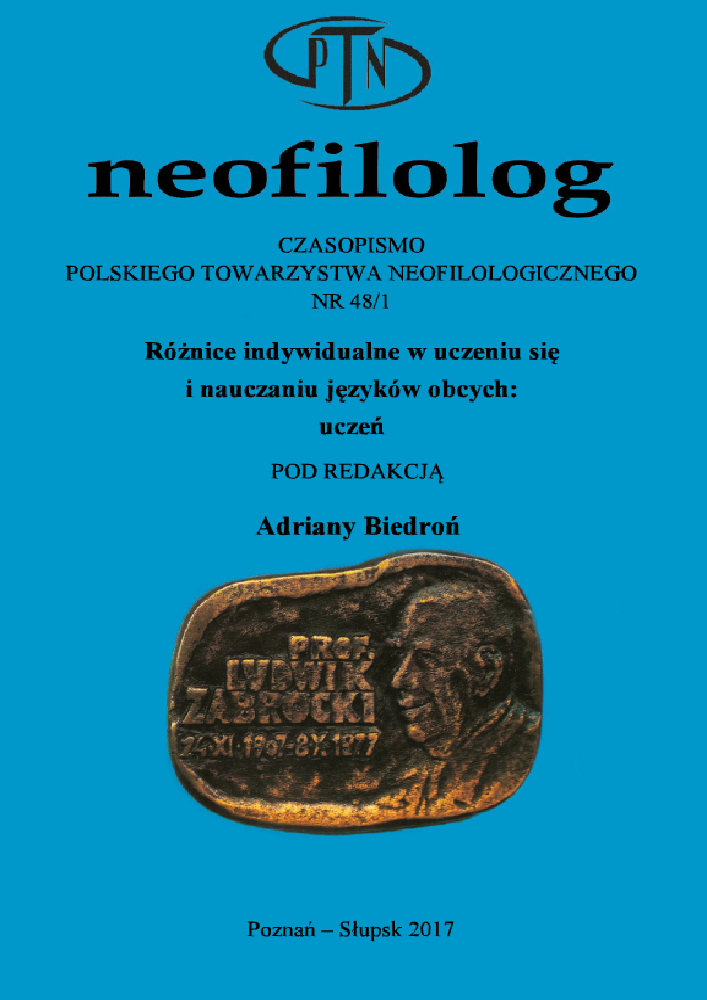Abstract
In general terms, this article presents the practical aspects of narrative forms in research on the process of foreign language learning and teaching. In detail, its purpose is to describe the written auto-narration inquiry concerning the impact of individual factors (savoir-être) in the course of language learning. The article contains a description of the object, the purpose as well as the opinions and feelings of the respondents on the practical implementation of their auto-narrative inquiries.References
Biernacka-Licznar, K. 2013. „Narracyjne studium życia na przykładzie studentów Wydziału Filologicznego Uniwersytetu Wrocławskiego”. Italica Wratislaviensia, 4 – Nauczanie języka i literatury w Polsce i we Włoszech: 9-27.
Bluck, S. i T. Habermas. 2000. „The Life Story Schema”. Motivation and Emotion, 24: 121-147.
Bourdieu, P. 1986. „L’illusion biographique”. Actes de la recherche en sciences sociales, 62-63 – L’illusion biographique: 69-72.
Burzyńska, A. 2004. „Kariera narracji. O zwrocie narratywistycznym w humanistyce”. Teksty Drugie, 1-2: 43-64.
Byram, M., Barrett, M., Ipgrave, J., Jackson, R. i M. C. Méndez Garcia. 2011. Autobiografia spotkań międzykulturowych. Warszawa: Ośrodek Rozwoju Edukacji.
Cosnier, J. 2015. Psychologie des émotions et des sentiments [online: http://icar.univlyon2.fr/membres/jcosnier/Emotions_et_sentiments.pdf; DW 7.12.2016].
Góralski, A. (red.). 2009. Metody badań pedagogicznych w zarysie. Warszawa: Wydawnictwo Universitas Rediviva, wyd. 4.
Hamon, P. 1975. „Clausules”. Poétique, 24: 495-526.
Kline, P. 2000. „Testy osobowości”. (w) Psychologia różnic indywidualnych. (red. S. E. Hampson i A. M. Colman). Poznań: Zysk i S-ka, str. 108-133.
Kreutz, M. 1962. Metody współczesnej psychologii. Warszawa: Państwowe Zakłady Wydawnictw Szkolnych.
Lungo, A. (del). 1993. „Pour une poétique de l’ incipit”. Poétique, 94: 131-151.
Łobocki, M. 2006. Metody i techniki badań pedagogicznych. Kraków: Oficyna Wydawnicza „Impuls”.
Orofiamma, R. 2008. „Les figures du sujet dans le récit de vie”. Informations sociales, 145: 68-81.
Pawlak, M., Bartczak, E., Lis, Z. i I. Marciniak. 2006. Europejskie portfolio językowe dla uczniów szkół ponadgimnazjalnych i studentów. Warszawa: Centralny Ośrodek Doskonalenia Nauczycieli.
Ricoeur, P. 1985. Temps et récit, tom 3: Le temps raconté. Paris: Le Seuil.
Ricoeur, P. 1990. Soi-même comme un autre. L’ordre philosophique. Paris: Le Seuil.
Rubacha, K. 2008. Metodologia badań nad edukacją. Warszawa: Wydawnictwa Akademickie i Profesjonalne.
Schütze, F. 1975. Sprache soziologisch gesehen. München: Fink.
Smuk, M. 2014a. „Savoir-être: wyzwanie epistemologiczne”. (w) Refleksja w uczeniu się i nauczaniu języków obcych. Acta Universitatis Wratislaviensis. (red. M. Baran-Łucarz). Wrocław: Wydawnictwo Uniwersytetu Wrocławskiego, str. 281-292.
Smuk, M. 2014b. „Le savoir-être de l’apprenant au service du processus d’autonomisation”. (w) Synergies Chine 9/2014. Autonomie dans l’apprentissage des langues et apprentissage de l’autonomie. (red. F. Rong i P. Mogentale). Sylvains-les-Moulins – Beijing/Pékin: Éditions GERFLINT – Université des Langues étrangères de Beijing, str. 41-51.
Smuk, M. 2014c. „Le savoir-être des deux sexes face à l’apprentissage des langues: entre binarité et continuum”. (w) SOCLES Revue de SOCiolinguistique et de sociodidactique des LanguES 5/2014. Rôles masculins et féminins dans les usages sociaux langagiers: quelles rencontres? Quelles fractures? Quelles dynamiques? (red. M. Rispail). Alger: École Normale Supérieure de Bouzaréah – Alger, str. 87-100.
Smuk, M. 2016. Od cech osobowości do kompetencji savoir-être – rozwijanie samoświadomości w nauce języków obcych. Lublin – Warszawa: Wydawnictwo Werset– Instytut Romanistyki Uniwersytetu Warszawskiego.
Soroko, E. 2010. „Określanie wad i zalet metod generowania autonarracji”. (w) Badania narracyjne w psychologii. (red. M. Straś-Romanowska, B. Bartosz i M. Żurko). Warszawa: Eneteia.
Soroko, E. 2013. „Kwestionariusz inklinacji autonarracyjnej (IAN-R) – pomiar skłonności do narracyjnego opracowywania i relacjonowania doświadczenia”. Studia Psychologiczne, 51: 5-18.
Villers, G. (de). 2011. „L’approche autobiographique: regards anthropologique et épistémologique, et orientations méthodologiques”. Recherches sociologiques et anthropologiques, 42-1: 25-44 [online: http://rsa.revues.org/653; DW 14.12.2016].
Werbińska, D. 2010. „Moja podróż z językiem obcym – narracyjne badanie autobiograficzne”. (w) Neofilolog 34 – Glottodydaktyka jako nauka. (red. H. Widła), str. 91-109.
Werbińska, D. 2012. „Akwizycja języka obcego w perspektywie studenta filologii: badanie tożsamości narracyjnej studenta w kontekście czasoprzestrzeni i heteroglosji”. (w) Neofilolog 39/1 – Polskie badania nad akwizycją języków. (red. U. Paprocka-Piotrowska), str. 55-80.
License
Copyright (c) 2017 Maciej Smuk

This work is licensed under a Creative Commons Attribution-NoDerivatives 4.0 International License.
Authors
Authors of texts accepted for publication in Neofilolog are required to complete, sign and return to the Editorial team’s office the Agreement for granting a royalty-free license to works with a commitment to grant a CC sub-license.
Under the agreement, the authors of the texts published in Neofilolog grant Adam Mickiewicz University in Poznań a non-exclusive, royalty-free license and authorize the use of Attribution-NoDerivatives 4.0 International (CC BY-ND 4.0) Creative Commons sub-license.
The authors retain the right to the free disposal of the work.
Users
Interested Internet users are entitled to use works that have been published in Neofilolog since 2017, under the following conditions:
▪ attribution – obligation to provide, together with the distributed work, information about the authorship, title, source (link to the original work, DOI) and the license itself.
▪ no derivatives – the work must be preserved in its original form. Without the author's consent, it is not possible to distribute the modified work in the form of translations, publications, etc.
Copyrights are reserved for all texts published since 2017.
Miscellaneous
Adam Mickiewicz University in Poznań retains the property right as a whole (layout, graphic form, title, cover design, logo etc.).
